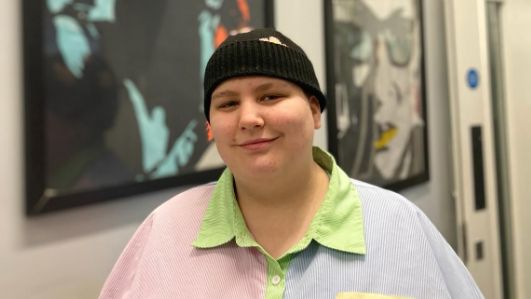 Image source, BBC/Elaine Dunkley
Image source, BBC/Elaine Dunkley
"Work is still a long way off for me," Rhyen says
Christina McSorley
BBC News
The number of 16-24 year-olds not in employment, education or training (Neet) across the UK reached 872,000 in the period April to June 2024, official estimates suggest.
As the government tries to tackle the "unacceptable" rising levels of worklessness, BBC News has spoken to two young people about the obstacles they are facing.
“I have various barriers to employment - I’ve got mental health issues, I’ve got a lot of physical health issues - but I don’t not do anything.”
At 23, Rhyen feels the world of work is a long way off.
“I was very aware that I was different,” says Rhyen, who uses he/they pronouns.
Diagnosed autistic in Year 11, Rhyen, who asked that their surname be withheld, says their late diagnosis meant they missed out on some educational support - even though teachers did their best.
“I was very aware that I was different,” Rhyen says.
“I got bullied quite badly.
"I didn't want to go to classes, which meant that I ended up failing every single GCSE I had, apart from one, which was maths.”
'The world is not built for people like me'
After GCSEs, Rhyen took a technical theatre course - but mental health struggles meant they felt unable to apply for jobs.
Then, a friend introduced them to a support service called The Warren Youth Project, in Hull. The charity is funded by grants, including one from the National Lottery.
At the project, Rhyen works with a team called The Recruitables, who research youth unemployment in the area.
“I know from the research we do, there are just not the support services that people actually need," Rhyen says.
“The world is not built for people like me.”
But with The Warren's support, Rhyen is preparing to apply for jobs.
The day we went to visit, Rhyen had just finished a cookery class, making biscuits.
Building towards a Level 2 food hygiene qualification, the cookery classes at The Warren also help young people build confidence, time-management, and communication skills.
Rhyen says “I just don’t have the confidence” to face the world of work yet, but they are working towards it.
The total of 872,000 Neets between April and June this year, according to Office for National Statistics estimates released on Thursday,, external is a 74,000 increase on the same period last year.
The new figures suggest that 12.2% of all young people aged 16 to 24 were Neet during this time.
Young people not in employment can be:
unemployed - actively seeking work
economically inactive - not seeking work
About two-thirds of Neets (66%) fall into the economically inactive category.
The post-Covid rise in the number of young Neets has been driven entirely by the inactive group, who have in turn contributed to a significant rise in economic inactivity across all ages over the same period.
A total of 9.4 million, external people are currently economically inactive in the UK. Most of them are students, retired or have caring responsibilities, but about one-fifth of them say they do want a job, according to the Office for Budget Responsibility (OBR).
The UK , externalstill has more people out of its workforce than in 2019, external - by over 1% of the working-age population. That is important because a smaller workforce means less tax to pay for services like the NHS, and greater spending on benefits.
The OBR estimates , externalthat government spending on universal credit (and the benefits it is replacing) reached £80.9bn last year. That is more than the government spends on defence (£54.2bn). Seven million, external people are currently on universal credit, with about a third of them (38%) in work.
When it comes to addressing the rising number of young people not in education, employment or training, the government says it recognises the "complex, long-standing nature of the challenge" and says it has a raft of measures planned to tackle it, including creating a new body, Skills England, to address skills needs; and a new Youth Guarantee of access to training, apprenticeships and back-to-work support.
Youth Futures Foundation,, external an independent, not-for-profit organisation trying to remove the disparities in young people's employment outcomes, calls the number of Neets “a crisis”.
In a report given exclusively to BBC News, the charity says groups at risk of social and economic marginalisation are more likely to be Neet - and the rates vary with gender, ethnicity, disability and geography.
The report highlights:
significant regional variation - with north-east England showing the highest rate of Neets at 15%
19 to 21 year-olds with experiences of the care system are about three-and-a-half times more likely to be Neet, government figures from 2021 suggest
The proportion of young people who are Neet has only fallen slightly in the last 20 years (from 15.3% in 2002 to 12.6% in early 2024)
poor mental health is a major barrier to employment for many young people, with the number of them out of work because of ill health doubling in 10 years, to about 190,000 last year.
Youth Futures Foundation principal economist Dr Andrea Barry calls the number of Neets “a tragedy”.
“We know that if young people drop out of school or take a while to find a job, they are much more likely to be out of work a decade later.
"They are also more likely to remain trapped in low-paid work into adulthood.”
Image source, BBC/Elaine Dunkley
Image caption,Dr Andrea Barry wants young people to have better access to apprenticeships
Dr Barry is calling for all apprenticeships to offer every candidate a Level 2 or Level 3 entry requirement - many currently require Level 4, which is above A-level.
Apprenticeships help young people prepare for employment - “but not enough are able to access them”, Dr Barry says.
Youth Futures Foundation says supporting those most at risk is key.
And it points to the work of charities such as Right to Succeed, based in north-west England, which works to ensure children and young people have the best start in life.
Tomika Rogerson, a Right to Succeed engagement coach for local schools, supports young people most at risk of becoming Neet.
“Home lives can be difficult for students, if they’re in care or they’ve been removed from family members or been put into emergency accommodation,” she says.
Image source, Tomika Rogerson
Image caption,Tomika Rogerson works with young people at risk of becoming Neet
Ms Rogerson focuses on building personal relationships with students, and will often pay home visits and encourage young people to return to school.
“Children have been in situations that are completely out of their control,” she says.
“It’s so hard because if you’re not well physically, or mentally, the last thing you want to deal with is English and maths.”
Image source, BBC/John Boon
Image caption,After visiting colleges with his engagement coach, Kian hopes to run his own business eventually
Ms Rogerson‘s role includes checking in, at home, with students such as Kian.
From Year 7 to Year 11, Kian found school challenging and had extended absences.
“I was probably in like once or twice a month,” he tells us.
“When I first met Kian, I couldn’t get a word out of him for two to three months,” Ms Rogerson says.
“It’s gone from not speaking to me, to being wary, to where we are now.
“I’ll pick him up and go and visit colleges - or we’ll sit and work through problems.”
Kian now attends school regularly and is making plans for his future.
“The school has helped me realise I want to do baking," he says.
"It’s therapeutic and helps me calm down and de-stress.
“I’m excited about having my own bakery and having multiple shops across the UK.”
This week, Kian got the grades he needed to enrol on a professional bakery course at college.
A spokesperson for the Department for Education said the government is "determined" to break down barriers to opportunity for young people and transform their life chances.
“We will offer two weeks’ worth of work experience for every young person, better careers advice at school, create a new body, Skills England, to deliver national, regional and local skills needs, and bring in a new Youth Guarantee of access to training, apprenticeships and back-to-work support.”
Additional reporting by Kate McGough and Kristian Johnson

 Movie
Movie 3 months ago
31
3 months ago
31 




![Presidents Day Weekend Car Sales [2021 Edition] Presidents Day Weekend Car Sales [2021 Edition]](https://www.findthebestcarprice.com/wp-content/uploads/Presidents-Day-Weekend-car-sales.jpg)



 English (United States)
English (United States)